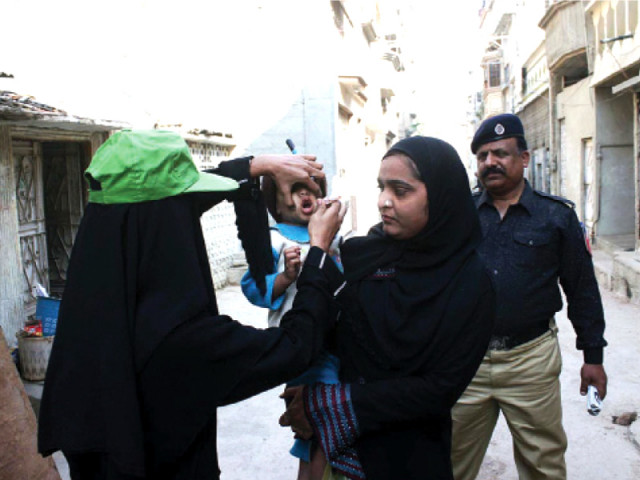Fighting setbacks: WHO expresses concern over unpaid polio workers
Claims new payment system cannot be applied unless district governments forward CNIC details.

"It is important the workers are paid on time to ensure they remain motivated in carrying out vaccination efforts WHO Chief Coordinator for Polio Eradication in Pakistan," Dr Elias Durry. PHOTO: ONLINE/FILE
Expressing concerns regarding the non-payment of stipends to polio teams in the city, the World Health Organization (WHO) on Thursday requested the Khyber-Pakhtunkhwa (K-P) government to expedite the remuneration disbursement process.
The organisation’s International Mission, headed by polio expert Dr Muhammad Al Muhammadi, arrived in the city on Wednesday to discuss the situation, terming the area to be the most dangerous in terms of circulation of the virus.
The team met high-ranking officials in a bid to streamline campaigns and remove hurdles in the way of providing each child with treatment.
“The press conference held by the Paramedic Association against non-payment of stipends for polio workers was a cause of concern for the organisation,” said an official requesting anonymity. The official added frontline health workers should be paid on time.
“We stand with the vaccinators and will not leave a single stone unturned to ensure that each and everyone gets paid on time,” said WHO Chief Coordinator for Polio Eradication in Pakistan Dr Elias Durry.
Durry said a new process had been initiated under which WHO would directly pay vaccinators. He added, however, some districts in the province were not sending details of Computerised National Identity Cards (CNIC), delaying the payment process.
“We release the amount in 48 hours after we receive the CNICs. Look at the campaign in Lakki Marwat. It was held on January 21, but we received the cards on March 29 because of the district government,” said Durry
He added the campaign in Kohat was completed on January 21, and payments were made immediately after receiving card details on January 25. The worse affected region is Mardan, where the anti-polio campaign was completed on January 31, but not a single identity card has been forwarded yet in order to secure payment.
“The real heroes of the fight against polio are the polio workers who put their own life in danger to ensure children are protected against the virus,” said Durry. “It is important the workers are paid on time to ensure they remain motivated in carrying out vaccination efforts across the country.”
The WHO official claimed the newly reported positive environmental samples for the P1 subtype virus found in Peshawar’s sewage water warrant an emergency polio campaign in the city. “The only way to ensure each and every child in Peshawar is protected against the crippling P1 virus is to initiate an emergency polio campaign that targets all children under the age of five as soon as possible.”
Published in The Express Tribune, April 5th, 2013.













COMMENTS
Comments are moderated and generally will be posted if they are on-topic and not abusive.
For more information, please see our Comments FAQ